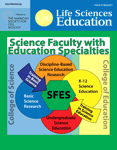A Study Assessing the Potential of Negative Effects in Interdisciplinary Math–Biology Instruction
Abstract
There is increasing enthusiasm for teaching approaches that combine mathematics and biology. The call for integrating more quantitative work in biology education has led to new teaching tools that improve quantitative skills. Little is known, however, about whether increasing interdisciplinary work can lead to adverse effects, such as the development of broader but shallower skills or the possibility that math anxiety causes some students to disengage in the classroom, or, paradoxically, to focus so much on the mathematics that they lose sight of its application for the biological concepts in the center of the unit at hand. We have developed and assessed an integrative learning module and found disciplinary learning gains to be equally strong in first-year students who actively engaged in embedded quantitative calculations as in those students who were merely presented with quantitative data in the context of interpreting biological and biostatistical results. When presented to advanced biology students, our quantitative learning tool increased test performance significantly. We conclude from our study that the addition of mathematical calculations to the first year and advanced biology curricula did not hinder overall student learning, and may increase disciplinary learning and data interpretation skills in advanced students.



